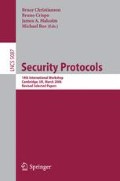Abstract
The dining cryptographers network (or DC-net) is a seminal technique devised by Chaum to solve the dining cryptographers problem — namely, how to send a boolean-OR bit anonymously from a group of participants. In this paper, we investigate the weaknesses of DC-nets, study alternative methods and propose a new way to tackle this problem. Our protocol, Anonymous Veto Network (or AV-net), overcomes all the major limitations of DC-nets, including the complex key setup, message collisions and susceptibility to disruptions. While DC-nets are unconditionally secure, AV-nets are computationally secure under the Decision Diffie-Hellman (DDH) assumption. An AV-net is more efficient than other techniques based on the same public-key primitives. It requires only two rounds of broadcast and the least computational load and bandwidth usage per participant. Furthermore, it provides the strongest protection against collusion — only full collusion can breach the anonymity of message senders.
Access this chapter
Tax calculation will be finalised at checkout
Purchases are for personal use only
Preview
Unable to display preview. Download preview PDF.
References
Chaum, D.: The dining cryptographers problem: unconditional sender and recipient untraceability. Journal of Cryptology 1(1), 65–67 (1988)
Golle, P., Juels, A.: Dining Cryptographers Revisited. In: Cachin, C., Camenisch, J.L. (eds.) EUROCRYPT 2004. LNCS, vol. 3027, pp. 456–473. Springer, Heidelberg (2004)
Boneh, D.: The decision Diffie-Hellman problem. In: Buhler, J.P. (ed.) ANTS 1998. LNCS, vol. 1423, pp. 48–63. Springer, Heidelberg (1998)
Goldwasser, S., Micali, S.: Probabilistic encryption. Journal of Computer and System Sciences 28, 270–299 (1984)
Chaum, D., Evertse, J.H., Graaf, J.V.D., Peralta, R.: Demonstrating possession of a discrete log without revealing it. In: Odlyzko, A.M. (ed.) CRYPTO 1986. LNCS, vol. 263, pp. 200–212. Springer, Heidelberg (1987)
Chaum, D., Evertse, J.H., Graaf, J.V.D.: An improved protocol for demonstrating possession of a discrete logarithm and some generalizations. In: Price, W.L., Chaum, D. (eds.) EUROCRYPT 1987. LNCS, vol. 304, pp. 127–141. Springer, Heidelberg (1988)
Schnorr, C.P.: Efficient signature generation by smart cards. Journal of Cryptology 4(3), 161–174 (1991)
Camenisch, J., Stadler, M.: Proof systems for general statements about discrete logarithms. Technical report TR 260, Department of Computer Science, ETH Zürich (March 1997)
Fiat, A., Shamir, A.: How to prove yourself: practical solutions to identification and signature problems. In: Odlyzko, A.M. (ed.) CRYPTO 1986. LNCS, vol. 263, pp. 186–194. Springer, Heidelberg (1987)
Brandt, F.: Efficient cryptographic protocol design based on distributed El Gamal encryption. In: Won, D.H., Kim, S. (eds.) ICISC 2005. LNCS, vol. 3935, pp. 32–47. Springer, Heidelberg (2006), http://www7.in.tum.de/~brandtf/studies.shtml
Goldreich, O., Micali, S., Wigderson, A.: How to play any mental game or a completeness theorem for protocols with honest majority. In: Proceedings of the nineteenth annual ACM Conference on Theory of Computing, pp. 218–229 (1987)
Kiayias, A., Yung, M.: Non-interactive zero-sharing with applications to private distributed decision making. In: Wright, R.N. (ed.) FC 2003. LNCS, vol. 2742, pp. 303–320. Springer, Heidelberg (2003)
Groth, J.: Efficient maximal privacy in boardroom voting and anonymous broadcast. In: Juels, A. (ed.) FC 2004. LNCS, vol. 3110, pp. 90–104. Springer, Heidelberg (2004)
Wright, M., Adler, M., Levine, B.N., Shields, C.: The predecessor attack: an analysis of a threat to anonymous communications systems. ACM Transactions on Information and Systems Security (TISSEC) 7(4) (2004)
Beaver, D., Micali, S., Rogaway, P.: The round complexity of secure protocols. In: Proceedings of the twenty-second annual ACM Symposium on Theory of Computing, pp. 503–513 (1990)
Gennaro, R., Ishai, Y., Kushilevitz, E., Rabin, T.: On 2-round secure multiparty computation. In: Yung, M. (ed.) CRYPTO 2002. LNCS, vol. 2442, pp. 178–193. Springer, Heidelberg (2002)
Schneier, B.: Applied Cryptography. J. Wiley and Sons, Chichester (1996)
Yao, A.: How to generate and exchange secrets. In: Proceedings of the twenty-seventh annual IEEE Symposium on Foundations of Computer Science, pp. 162–167 (1986)
Author information
Authors and Affiliations
Editor information
Editors and Affiliations
Rights and permissions
Copyright information
© 2009 Springer-Verlag Berlin Heidelberg
About this paper
Cite this paper
Hao, F., Zieliński, P. (2009). A 2-Round Anonymous Veto Protocol. In: Christianson, B., Crispo, B., Malcolm, J.A., Roe, M. (eds) Security Protocols. Security Protocols 2006. Lecture Notes in Computer Science, vol 5087. Springer, Berlin, Heidelberg. https://doi.org/10.1007/978-3-642-04904-0_28
Download citation
DOI: https://doi.org/10.1007/978-3-642-04904-0_28
Publisher Name: Springer, Berlin, Heidelberg
Print ISBN: 978-3-642-04903-3
Online ISBN: 978-3-642-04904-0
eBook Packages: Computer ScienceComputer Science (R0)

